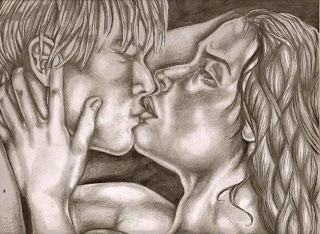Being creative is something
that my life has encompassed since I was a child. I started dancing when I was
three years old and kept it up for over twenty years. I did drama and singing,
drama I didn’t like so much but I loved to sing. During primary school I learnt
to play the piano, clarinet and saxophone, and kept the piano up in early high
school. I used to do creative writing
and art.
I went to a performing arts
high school and spent my days amongst a creative bunch of teenagers. I majored
in dance (yes it was totally like Fame we used to bust out in the playground)
but also continued art. I spent my first year out of high school doing a full
time performing arts course before attending university.
Then my sight deteriorated. I
stopped everything. Dancing had been my entire life; all my closest friends are
from dancing. It wasn’t an immediate reaction, but I slowly gave things up and
attributed it to ‘growing up’. Who says you need to stop doing things you love because
you are getting older?!
Over the past months I’ve
realised how being creative was something I enjoyed and shouldn’t let my lack
of vision get in the way. I’ve made a conscious decision to start to ease back
into the things I enjoyed and find ways to participate despite my sight. I know
that it is going to be different doing these activities but I’m choosing to
look at it as a challenge and as a new adventure.
My first focus is on playing
the piano again. We have two pianos in my house and it’s time somebody actually
played them! About two years ago I started private classes again to get back
into it but it was extremely hard explaining my vision to the teacher and
finding a way to learn because I couldn’t read the music. I had never learnt
from ear and wasn’t sure how to start. I ended up giving up after a few months.
This time I’m determined to
get my fingers working again. I have decided to learn braille music. I will
admit it looks utterly daunting with all the dots everywhere. I do like to
challenge myself so I am going to give it my best shot.
Another thing I’ve started is
colouring. Art therapy is all the rage at the moment and I couldn’t miss out! I
downloaded a colouring app (Colorfy) on my iPad and Samsung phone and it was
great. You can zoom in and tap the spaces to fill in colour. Of course I wanted
to do the real thing so I bought myself a mandala colouring book. I promised
myself that I wouldn’t get frustrated if I couldn’t do it. I spent three hours
calmly colouring in tiny spaces using only my peripheral vision. I don’t think
I’ve ever sat still for that long! It was definitely calming but each stroke,
as I guessed where some of the lines where or made mistakes, helped me accept a
little more that my sight has deteriorated and also reinforced I can still do
things if I really try.
If you think you need to give
up a hobby or passion because you are losing your sight, don’t. If you think
you can’t do something because your sight will prevent you, you can. If you’ve
given up something you loved due to your sight, give it another go.
Being creative is part of
being human. For you it may be writing, drawing, dancing, crafts, cooking, absolutely
anything. Make yourself engage in it again.
Pick up something you did when you
were a child and see how carefree you feel again. There’s no harm in trying!
Apart from my braille piano project I plan to get back into the dance
studio. I know this is going to be a
huge challenge but determination will always prevail. Never give up on things that make you happy.
There’s always a way to participate and be creative.










.jpg)













